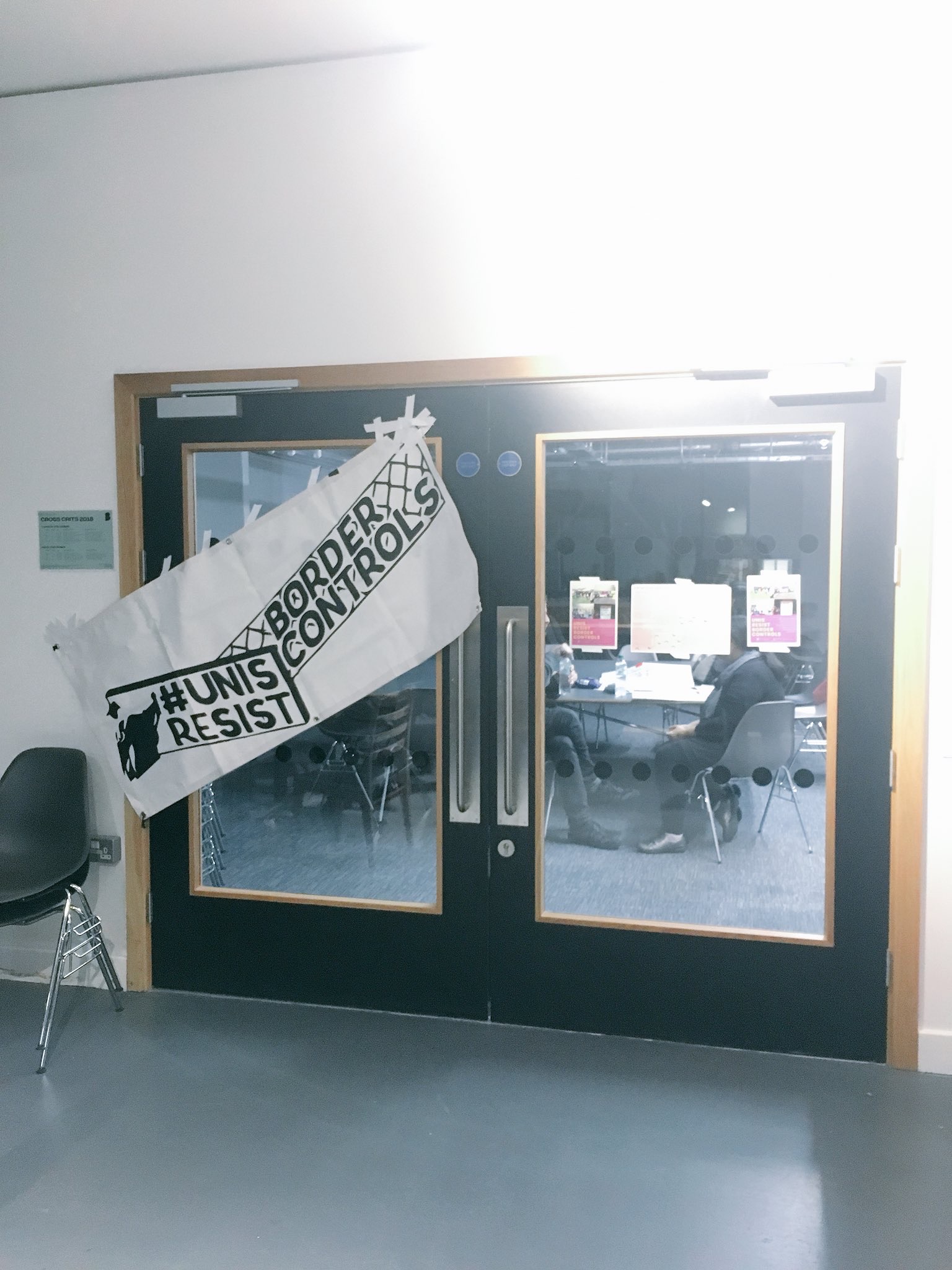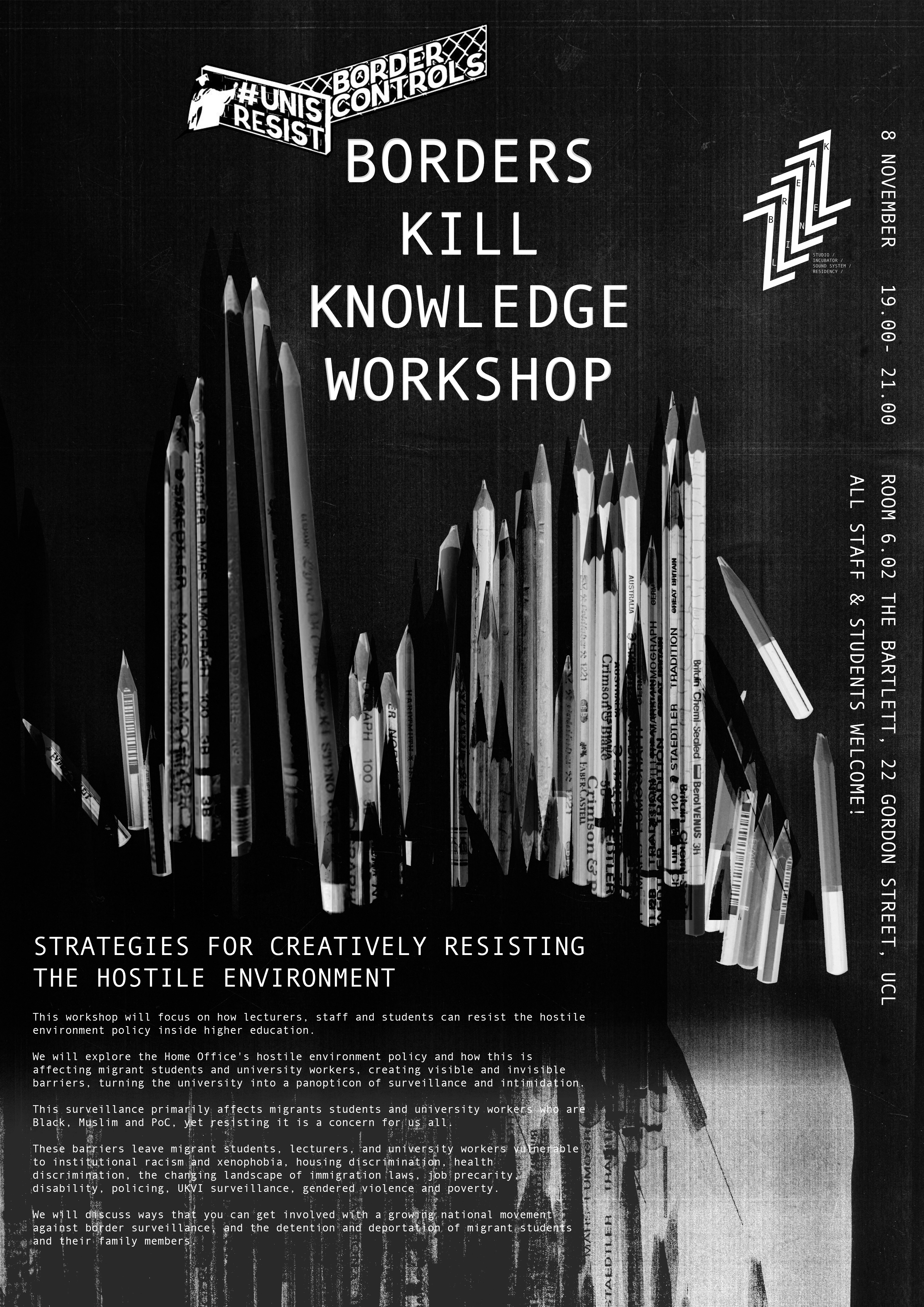Unis Resist Border Controls Workshop
In the summer of 2018, an email was sent to staff at one Bartlett department, warning that if they failed to enact immigration checks on international students, they could be liable to a personal fine of £20,000. This was in the context of increased hostility towards and surveillance of international students at UCL: according to The Guardian, lecturers had been advised to carry out ‘random spot checks’ on their students’ identity documents, along with other forms of attendance monitoring.
When Unis Resist Borders Controls (URBC)—an advocacy and activist group for refugees and migrants in UK universities—published a screenshot of the email on twitter, the Dean of the Bartlett responded by saying that the email had been sent out ‘in error’ and that this was not Bartlett policy. This response was confusing—how can you threaten your staff with a £20,000 fine by mistake?
In response, BREAK//LINE invited URBC to lead a participatory workshop at the Bartlett around the ways in which the hostile environment policy is enacted in higher education institutions, from seemingly passive measures such as attendance monitoring to more explicitly violent actions such as the abandonment of vulnerable staff and students when complications in legal status arise.
During the workshop, Sanaz Raji and Sam Solomon shared the URBC ‘migrantfesto’, which includes calls for free education, free movement and free healthcare for all migrants, as well as the call for migrants to be able to take legal recourse against institutions without any impact on their visa status, and for universities to pay for legal support for students and staff facing detention and deportation. The ‘migrantfesto’ makes the demand for an end of surveillance culture on campus and an end to universities working with and/or investing in the arms trade, prisons, fossil fuels and private security firms.
We also covered the history of the hostile environment policy—as we learnt from Sanaz and Sam, the hostile environment is a series of policies designed to make life as difficult as possible for undocumented migrants, but has impacts on those who have legal rights too. Sam and Sanaz showed some of the ways in which the hostile environment manifests in Higher Education environments through restrictive instruments and practices: limits on the number of hours that people can work; surveillance and monitoring of people’s lives (international students from certain countries have to register and give police details of their address and contact details); restrictions on the number of days people can spend outside of the UK; restrictions on funding based on immigration status/nationality; and limits on the number of unauthorized absences people can take without being reported to the Home Office.
Sanaz and Sam linked these limitations on the actions of migrant students to attempts to control student activism: in the 1970s and 1980s, student activism in the UK was often led and supported by migrant students, and restrictive measures consequently have roots in the desire to quell activism in academic spaces. This has become particularly apparent recently, when restrictions on unauthorised absences for migrant staff became important during University strikes: members of staff on visas feared that going on strike could jeopardise their immigration status, or applications for future visas or residency. While the law has recently changed to allow migrants the right to take strike action, there is still the danger that pay deductions made as a result of strikes could take migrant staff below the required pay thresholds for their visa status.
While universities often attempt to justify their actions by claiming to be following the law, different universities have different practices of monitoring and surveillance. Often, universities enforce stricter measures than required by law because they fear the government will remove their ability to sponsor international students, whose fees are crucial to university funding. This shows the entanglement of university financing and exclusionary policies: if higher education was free, universities could avoid their current position, where they are encouraged to treat their students and staff with hostility to maintain an income.
In the final section of the workshop, we discussed possible actions in response to the hostile environment in higher education. We encourage people to join URBC (you can find them @unisnotborders on twitter) to coordinate the resistance: coordinated efforts linking across platforms and institutions bring bigger gains and stronger movements!
Sam and Sanaz also encouraged us to have conversations about how hostility is enacted across different departments and crucially to show active solidarity with students and staff affected by detention, deportation and other restrictions posed by hostile environment policies. Those in more secure positions have greater power and a responsibility in the interests of us all to build an equitable, fair academic environment. This workshop was open and freely available to all, including the general public, and was supported by donations which were made by members of Bartlett staff to BREAK//LINE.
BREAK//LINE

